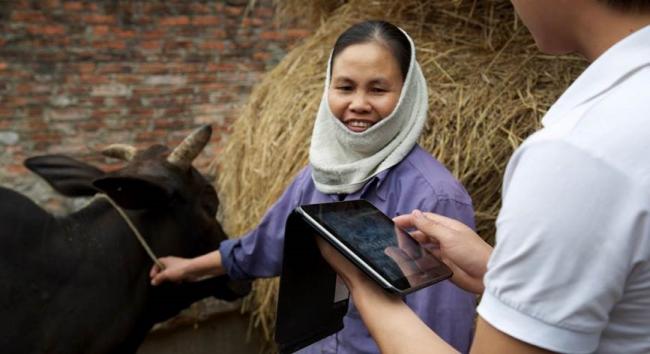How the World Bank's Water Global Practice and Innovation Labs are partnering to get practical operational solutions.
Published on: 09/06/2016

Results verification in the Program for Results (PforR) instrument aims to ensure that reported outputs were actually achieved, and that they meet the performance standards specified in the Disbursement-Linked Indicators (DLIs). The fact that disbursements are tied to independently verified results elevates the role of verification for both the client and the Bank. However, as the rigor of results verification increases, so does the cost, and successful verification systems require significant resources and investment in monitoring and reporting systems. To ensure credibility and sustainability of results verification in PforR, we need to find ways to increase efficiency through the use of technology that can simultaneously reduce costs and enhance rigor.
In the PforR of Rural Water Supply and Sanitation in Vietnam’s Red River Delta, the task team knew that a traditional pen and paper verification would be a lengthy process and would introduce errors into the verification process, affecting credibility. This was the first PforR in the water sector so a lot was at stake.
The Bank team and the client also wanted a way to track progress in meeting certain criteria, so that verification could be halted if these checks were not met.
For that reason, the task team partnered with the ICT Unit to introduce mobile data collection in the first round of verification. This was the first time this approach was tried in a PforR operation. The benefits were immediately evident: access to data in real time through an online database system, complete with mapping functionality to visualize where verification was taking place, and the ability to quickly catch errors before they became systematic.
Mobile data collection also increased the transparency of the verification process since each output was geo-coded and photographed – any doubts or questions about compliance could refer back to these data points as evidence.
After experiencing the benefits of mobile data collection first-hand, and the high levels of accuracy that random sampling with well-trained enumerators can achieve, the government is piloting these methods in its own national monitoring system for water supply and sanitation.
The task teams in Vietnam and in another PforR of Sustainable Rural Sanitation Services Program for Results in Egypt are still looking for ways to increase efficiency and over the next year, in partnership with the Innovation Labs, will pilot several new approaches to see what can be scaled. The aim of these pilots is to influence the way verification is done in Water PforRs in Vietnam and elsewhere, as well as in PforR projects in other sectors. These include:
The cost of verification should not be a barrier to measuring results that are relevant to the goals of the program supported by a PforR. Indeed, failure to find cost-efficient ways of doing results verification may have the unintended consequence of shifting DLIs to those that are easier and less costly to verify.
As countries shift focus towards monitoring and tracking achievement of the Sustainable Development Goals, which go beyond basic infrastructure typologies to more sophisticated measures of quality, accessibility, availability, affordability, accountability and sustainability, the PforR instrument becomes increasingly relevant to ensure these service level standards are achieved. Technology will be instrumental for enhancing the credibility and sustainability of results monitoring and verification.
For more information about the mobile data collection system and pilots, please contact Victor Vazquez (vvazquez@worldbank.org) and Claire Chase (cchase@worldbank.org). For more information about Innovation Labs’ support to projects on sensorization and Internet of Things, please contact Victor Mulas (vmulas@worldbank.org).
This blog, written by Claire Chase and Victor Vazquez, was originally published on the World Bank's Water Blog on 24 May 2016.
At IRC we have strong opinions and we value honest and frank discussion, so you won't be surprised to hear that not all the opinions on this site represent our official policy.